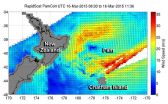(Press-News.org) Among approximately 19,000 individuals, the use of aspirin and nonsteroidal anti-inflammatory drugs (NSAIDs) was associated with an overall lower risk of colorectal cancer, although this association differed according to certain genetic variations, according to a study in the March 17 issue of JAMA.
Considerable evidence demonstrates that use of aspirin and other NSAIDs is associated with a lower risk of colorectal cancer. However, the mechanisms behind this association are not well understood. Routine use of aspirin, NSAIDs, or both for prevention of cancer is not currently recommended because of uncertainty about the risk-benefit profile. Understanding the relationship between genetic markers and use of aspirin and NSAIDs, also known as gene by environment interactions, can help to identify population subgroups defined by genetic background that may benefit most from use of these agents to prevent cancer, according to background information in the article.
Andrew T. Chan, M.D., M.P.H., of Massachusetts General Hospital, Boston, Li Hsu, Ph.D., of the Fred Hutchinson Cancer Research Center, Seattle, and colleagues conducted a genome-wide analysis of gene by environment interactions between regular use of aspirin, NSAIDs, or both and single-nucleotide polymorphisms (SNPs; genetic variations) in relation to risk of colorectal cancer. The researchers used data from 5 case-control and 5 cohort studies initiated between 1976 and 2003 across the United States, Canada, Australia, and Germany and included colorectal cancer case patients (n = 8,634) and matched controls (n = 8,553) ascertained between 1976 and 2011. Participants were all of European descent.
An analysis of the overall data indicated that regular use of aspirin and/or NSAIDs was associated with lower risk of colorectal cancer compared with nonregular use. But among individuals with two less common genotypes of rs16973225 (AC or CC, 9 percent of participants), no association was found between regular use and risk of colorectal cancer. And among participants with two rare genotypes of rs2965667 (TA or AA, 4 percent of participants), aspirin and/or NSAID use was associated with a higher risk of colorectal cancer.
In this genome-wide investigation of gene by environment interactions, "use of aspirin, NSAIDs, or both was associated with lower risk of colorectal cancer, and the association of these medications with colorectal cancer risk differed according to genetic variation at 2 SNPs at chromosomes 12 and 15. Validation of these findings in additional populations may facilitate targeted colorectal cancer prevention strategies," the authors write.
(doi:10.1001/jama.2015.1815; Available pre-embargo to the media at http://media.jamanetwork.com)
Editor's Note: Please see the article for additional information, including other authors, author contributions and affiliations, financial disclosures, funding and support, etc.
Editorial: Aspirin and NSAID Chemoprevention, Gene-Environment Interactions, and Risk of Colorectal Cancer
"In the not-too-distant future it will be possible to affordably and efficiently conduct genetic testing in healthy individuals to more accurately define benefits and risks of interventions intended to decrease risk of disease," writes Richard C. Wender, M.D., of the American Cancer Society, Atlanta, in an accompanying editorial.
"It will be important for primary care clinicians to understand genetic risk and to have informed, clear, literacy-adjusted, culturally competent discussions with their patients about how to use this information; otherwise, the goal of using genetic information to enhance decision making about prevention will remain elusive. Research needs to test different approaches to translating this complex information into practical methods to share information and improve clinical decisions. The ability to translate genetic profiling into tailored preventive care plans for individuals is still years away, but with the study by Nan et al, the road, arduous as it may be, is more clearly illuminated."
(doi:10.1001/jama.2015.1032; Available pre-embargo to the media at http://media.jamanetwork.com)
Editor's Note: The author has completed and submitted the ICMJE Form for Disclosure of Potential Conflicts of Interest and none were reported.
INFORMATION:
In a study in which pathologists provided diagnostic interpretation of breast biopsy slides, overall agreement between the individual pathologists' interpretations and that of an expert consensus panel was 75 percent, with the highest level of concordance for invasive breast cancer and lower levels of concordance for ductal carcinoma in situ and atypical hyperplasia, according to a study in the March 17 issue of JAMA.
Approximately 1.6 million women in the United States have breast biopsies each year. The accuracy of pathologists' diagnoses is an important and inadequately ...
Older adults who had spine imaging within 6 weeks of a new primary care visit for back pain had pain and disability over the following year that was not different from similar patients who did not undergo early imaging, according to a study in the March 17 issue of JAMA.
When to image older adults with back pain remains controversial. Many guidelines recommend that older adults undergo early imaging because of the higher prevalence of serious underlying conditions. However, there is not strong evidence to support this recommendation. Adverse consequences of early imaging ...
An additional 18 months of dual antiplatelet therapy among patients who received a bare metal coronary stent did not result in significant differences in rates of stent thrombosis (formation of a blood clot), major adverse cardiac and cerebrovascular events, or moderate or severe bleeding, compared to patients who received placebo, according to a study in the March 17 issue of JAMA. The authors note that limitations in sample size may make definitive conclusions regarding these findings difficult.
Current clinical practice guidelines recommend a minimum of only 1 month ...
An examination of the reporting of noninferiority clinical trials raises questions about the adequacy of their registration and results reporting within publicly accessible trial registries, according to a study in the March 17 issue of JAMA.
Noninferiority clinical trials are designed to determine whether an intervention is not inferior to a comparator by more than a prespecified difference (known as the noninferiority margin). Selection of an appropriate margin is fundamental to noninferiority trial validity, yet a point of frequent ambiguity. Given the increasing ...
WASHINGTON, D.C., March 17, 2015 - Winter storms dumped records amounts of snow on the East Coast and other regions of the country this February, leaving treacherous, icy sidewalks and roads in their wake. Now researchers from Canada are developing new methods to mass-produce a material that may help pedestrians get a better grip on slippery surfaces after such storms.
The material, which is made up of glass fibers embedded in a compliant rubber, could one day be used in the soles of slip-resistant winter boots. The researchers describe the manufacturing process in a ...
For every parent who ever wondered what the heck their teens were thinking when they posted risky information or pictures on social media, a team of Penn State researchers suggests that they were not really thinking at all, or at least were not thinking like most adults do.
In a study, the researchers report that the way teens learn how to manage privacy risk online is much different than how adults approach privacy management. While most adults think first and then ask questions, teens tend to take the risk and then seek help, said Haiyan Jia, post-doctoral scholar in ...
Large-scale climate patterns that affect the Pacific Ocean indicate that waters off the West Coast have shifted toward warmer, less productive conditions that may affect marine species from seabirds to salmon, according to the 2015 State of the California Current Report delivered to the Pacific Fishery Management Council.
The report by NOAA Fisheries' Northwest Fisheries Science Center and Southwest Fisheries Science Center assesses productivity in the California Current from Washington south to California. The report examines environmental, biological and socio-economic ...
AUSTIN, Texas - A new method of testing the most common cause of life-threatening infection in people with cystic fibrosis could improve efforts to study and combat the illness.
The bacterium Pseudomonas aeruginosa is a leading contributor to hospitalizations, serious illness and early death for people with cystic fibrosis (CF). Scientists at The University of Texas at Austin have found a way to re-create conditions specific to the environment in which the bacterium spreads in the lungs of a person with CF, allowing them to identify several genes that appear to be necessary ...
The New Zealand Meteorological Service issued a Storm Warning for the Chatham Islands today as NASA's RapidScat instrument found that winds in one quadrant of Ex-Tropical Cyclone Pam is still generating tropical-storm-force winds east of its center.
The International Space Station's RapidScat instrument captured data on Ex-Tropical Cyclone Pam's winds on March 16 from 08:30 to 11:36 UTC. RapidScat revealed sustained winds over 30 meters per second (108 kph/67 mph) were still occurring southeast of the center.
The forecast calls for southwesterly winds to 50 knots (57 ...
INDIANAPOLIS - An Indiana University cancer researcher and her colleagues have identified genetic markers that may help determine who benefits from regular use of aspirin and other nonsteroidal anti-inflammatory drugs for lowering one's risk of developing colorectal cancer.
Previous studies have shown that regular use of aspirin and NSAIDs lower one's risk of colorectal cancer, but their use is not recommended as a way to prevent the disease because of uncertainty about the risks and benefits. Thus, the researchers set out to examine the interrelationship between genetic ...


